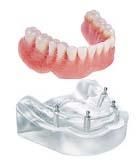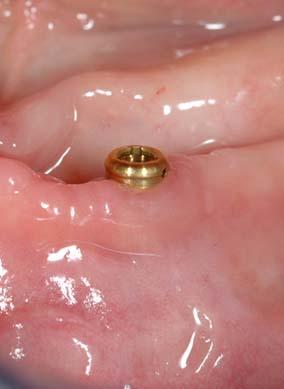Living with oral implants
Effects on quality of life and nutrition
Hovedinnhold
Background
Oral and dental disease can have a major impact on general health and quality of life. Twelve percent of Norwegian pensioner (67 years and older) were completely edentulous in 2003. Tooth loss may be caused by disease or injury, and may be related to a variety of life-factors. For whatever reason, missing teeth may have a number of consequences for the individual. Reduced mechanical and physiological function may reduce the patients' ability to enjoy tough and fibrous food, producing a possible negative effect on diet selection and nutrition and perhaps on general health. Even more severe consequences can be related to socio-psychological aspects such as altered self image, self perception and uncertainty in social situations.
The most commonly used treatment of edentulousness is still complete dentures. This restoration falls short of natural dentition in almost all aspects, and is only partially able to restore functions related to mechanical or physiological aspects. The mechanical shortcomings of a complete denture may be considerably improved by supporting it with two intraosseous implants.
General projects: A number of projects are under way with a view to better understand the adaptation to and acceptance of biomaterials retained by intraosseous titanium implants. Exploratory quantitative and qualitative research have been undertaken to reveal what specific interventions improve oral health. Research has also been conducted into how best to measure the relationship between general and oral health related quality of life. We are collaborating with researchers at National Institute of Nutrition and Seafood Research - NIFES on the effects of nutrition on oral health as well as exploring the concept of "disorder specific" quality of life measurements.
Present project
The present cohort randomized controlled clinical trial; n = 60, controls n = 40) was initially scheduled for two years, targeting edentulous persons, in general good health not older than 76 years from the Bergen area, Norway. The selected participants were all edentate, with objectively satisfactory dentures (upper and lower), but who were nevertheless subjectively dissatisfied with the lower denture. The participants were randomly divided into two groups: one receiving mandibular overdentures retained by two intraosseous titanium implants - the other with a simple reline designed to improve the fit of the denture. The participants are not informed of the alternative treatment before the completion of the project.
Aims
The overall aim of this ongoing study was to gain a better understanding of what it is like living with complete dentures and the effect the above two different treatment methods may have on general and oral health-related quality of life, food choices and nutritional status. Specifically, the aims of this project were:
- To study to what extent patients previously attending a dental school and treated with one or two complete removable dentures were satisfied with the way they had been taken care of in the dental clinic. To this end some aspects regarding the ambiance surrounding attendance and treatment are explored.
- To study the influence of demographic characteristics, denture history, function, and perceived oral health on patients' degree of satisfaction with conventional prostheses
- To study treatment differences one year after completion of treatment in terms of the OHIP-20 and SF-36 questionnaires, denture satisfaction, ways of coping and demographic characteristics
- To study treatment differences and assess social, personal, psychological, educational and physiological factors that may influence food choices (according to 24h-FFQ) and nutritional status (according to blood-derived values of key nutrients).
- To describe the reported causes of edentulousness and the impact of tooth loss on self esteem, social life, food choices, eating habits and the edentate's sense of healthy living
- To use both quantitative and qualitative methods to investigate the concept of "living with or without oral implants"
The project commenced in 2005, and will be completed in 2011.
Awards
BEST STUDENT ABSTRACT AWARD IADR NUTRITION GROUP, IADR, Toronto 2008
The award is designed to recognize excellence in nutrition and oral health research by a pre-doctoral or post-doctoral student. Abstracts will be judged based on originality, scientific rigor and potential impact on nutrition and oral health. The award consists of a certificate and a cash prize of $500.
Presentations/publications
- Lavik Å. Ernæringsstatus og kosthald hjå eldre personar med tannprotesar [Master thesis in human nutrition]. Bergen, University of Bergen 2008
- Gjengedal H, Lavik Å, Malde MK, Dahl L, Berg E, Trovik TA. Serum folate in dissatisfied complete conventional dentures wearers. 85rd General Session & Exhibition of the IADR, Toronto 2008
- Gjengedal H, Trovik TA, Berg E, Malde MK. Perceived oral health in different categories of denture wearers. 85rd General Session & Exhibition of the IADR, New Orleans; 2007
- Trovik TA, Gjengedal H, Grønningsæter AG, Berg E. Perception of oral- and general health among dissatisfied conventional denture-wearers. 85rd General Session & Exhibition of the IADR, Toronto 2008
- Trovik TA, Gjengedal H, Berg E, Malde MK. Validation of a Norwegian version of a denture-specific Oral-Health-Impact-Profile (OHIP-20). 85rd General Session & Exhibition of the IADR; New Orleans; 2007
Acknowledgement
The research is funded by the University of Bergen, the Meltzer Høyskolefond and Astra Tech.
Contact persons
Tordis A Trovik (Principal investigator)
Harald Gjengedal

